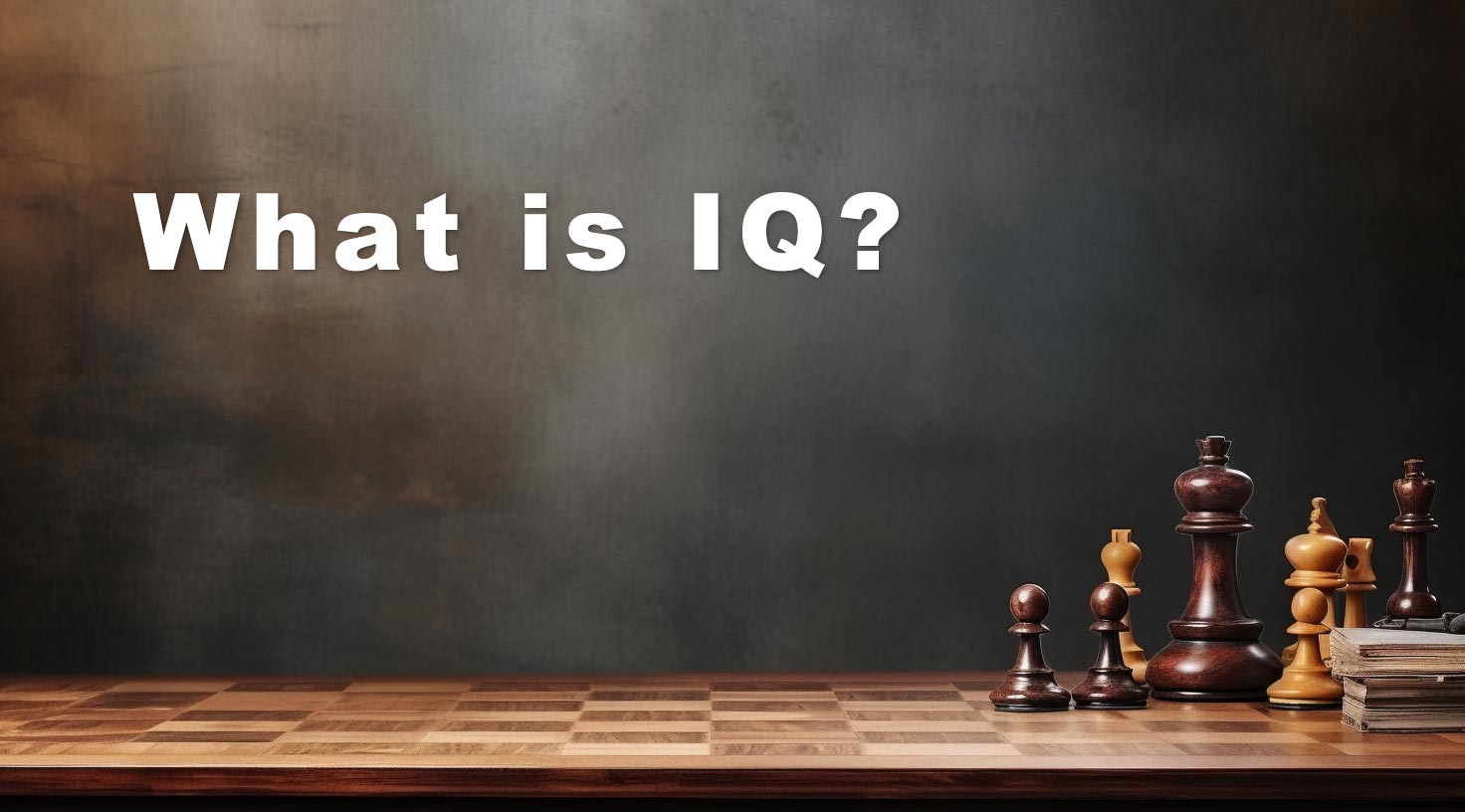Introduction
Intelligence, a complex and elusive concept, is a subject of fascination and inquiry throughout human history. In the early 20th century, psychologists sought to quantify this elusive quality, giving rise to the concept of Intelligence Quotient, or IQ. This short article delves to the intricacies of IQ, exploring its definition, historical roots, the methodology behind its measurement, and its implications in understanding human cognitive abilities.

Defining Intelligence Quotient (IQ)
The Basics
Intelligence Quotient, commonly called IQ, is really a numerical representation of an individual's intellectual abilities in terms of the common performance of the population. The concept behind IQ is to quantify cognitive capacities, encompassing skills such as for example problem-solving, reasoning, memory, and comprehension.
The IQ Score
The standardized IQ test produces a score that reflects an individual's performance set alongside the general population. A score of 100 is known as average, with higher scores indicating above-average intelligence and lower scores suggesting below-average performance. IQ scores are typically distributed in a bell curve, with the majority of the population falling within the common range.
Historical Roots of IQ Testing
Alfred Binet and the Birth of IQ Testing
The origins of IQ testing can be traced back to the task of French psychologist Alfred Binet in the early 20th century. Binet developed the very first intelligence test to recognize students needing additional educational support. The test aimed to measure mental age, or the amount of intellectual functioning, in accordance with chronological age.
Stanford-Binet Intelligence Scales
The idea of IQ gained further prominence with the adaptation and expansion of Binet's work by Lewis Terman at Stanford University. The Stanford-Binet Intelligence Scales, introduced in 1916, standardized the measurement of intelligence and contributed to the widespread usage of IQ testing in a variety of fields, including education and psychology.
The Methodology of IQ Testing
Components of IQ Tests
IQ tests typically comprise various components made to assess different cognitive abilities. These components may include verbal reasoning, mathematical problem-solving, spatial awareness, and memory recall. The combination of the components aims to offer a thorough breakdown of an individual's intellectual capabilities.
Standardization and Norms
IQ tests are administered under standardized conditions to make certain consistency in measurement. The answers are then compared to a normative sample, representing the performance of a varied band of individuals. This comparison allows for the determination of where an individual's score falls on the bell curve in accordance with the general population.
Types of IQ Tests
Over the years, several types of IQ tests have emerged, catering to diverse age ranges and cultural backgrounds. The Wechsler Adult Intelligence Scale (WAIS) and the Wechsler Intelligence Scale for Children (WISC) are trusted, encompassing a selection of cognitive domains to offer a thorough assessment.
Controversies Surrounding IQ Testing
Cultural Bias
One major criticism of IQ testing revolves around cultural bias. Critics argue that the style and content of several traditional IQ tests may favor individuals from certain cultural backgrounds, potentially disadvantaging those from different socio-economic or ethnic groups.
Single-Number Representation
Reducing the complex concept of intelligence to just one numerical score has been a supply of controversy. Critics argue that such a representation oversimplifies the intricate nature of cognitive abilities and neglects the richness of individual differences in intellectual functioning.
Influence of Socio-Economic Factors
Socio-economic factors, including use of quality education and socio-economic status, can significantly impact IQ test performance. Critics argue that IQ scores may not purely reflect innate intelligence but could possibly be influenced by environmental factors that donate to educational opportunities and life experiences.
The Evolving Understanding of Intelligence

Fluid Intelligence and Crystallized Intelligence
As our understanding of intelligence has evolved, researchers have distinguished between fluid intelligence and crystallized intelligence. Fluid intelligence involves the capability to solve novel problems and adapt to new situations, while crystallized intelligence refers to acquired knowledge and skills. This nuanced approach recognizes the dynamic nature of intellectual abilities.
Multiple Intelligences
In a reaction to the limitations of just one way of measuring intelligence, psychologist Howard Gardner proposed the theory of multiple intelligences. Gardner's model shows that intelligence is not a unitary concept but encompasses various domains, including linguistic, musical, interpersonal, and intrapersonal intelligences.
Emotional Intelligence
Daniel Goleman popularized the concept of emotional intelligence, highlighting the significance of understanding and managing emotions. Emotional intelligence emphasizes skills such as for example empathy, self-awareness, and effective interpersonal communication, acknowledging the significance of the abilities in overall cognitive functioning.
The Practical Implications of IQ
Educational Assessments
IQ testing has been found in educational settings to recognize students who may take advantage of additional support or advanced placement. The outcome of IQ tests can inform educators about a student's cognitive strengths and areas that could require further attention.
Employment and Cognitive Screening
Using professions, particularly those requiring problem-solving, analytical thinking, and decision-making skills, IQ tests can be utilized within the hiring process. However, the ethical implications of using IQ tests in employment settings have been a topic of discussion.
Intervention and Support
For people who have below-average IQ scores, early intervention and targeted support can be crucial. Identifying cognitive strengths and weaknesses through IQ testing can guide the development of tailored interventions to boost educational and life outcomes.
Ethical Considerations in IQ Testing
Addressing Bias
Efforts to address cultural bias in IQ testing are ongoing. Test developers work to generate assessments which can be culturally fair and do not disadvantage individuals from diverse backgrounds. This requires scrutinizing test items for potential cultural biases and ensuring that the test adequately measures cognitive abilities independent of cultural influences.
Recognizing Diversity
As our understanding of intelligence expands, there's a growing recognition of the diversity of cognitive abilities. Embracing this diversity involves acknowledging different types of intelligence, valuing individual strengths, and steering clear of the perpetuation of stereotypes based about the same way of measuring cognitive functioning.
Informed Consent and Privacy
In administering IQ tests, informed consent and privacy considerations are paramount. Test-takers must certanly be fully informed about the purpose of the test, how the outcome is likely to be used, and any potential implications. Respecting the confidentiality of IQ test results is vital to maintain trust and ethical standards.
Conclusion
In summary, IQ, as a concept and measurement, has undergone significant evolution since its inception in the early 20th century. From its origins in the works of Binet and Terman to contemporary discussions on multiple intelligences and emotional intelligence, our understanding of cognitive abilities continues to expand. While IQ testing has practical applications in education and assessment, ethical considerations regarding bias, diversity, and individual privacy are critical in shaping the future of intelligence assessment. As we navigate the complexities of quantifying intelligence, the journey is marked by a commitment to fairness, inclusivity, and a holistic understanding of the diverse ways in which individuals express their cognitive abilities.
No comments:
Post a Comment